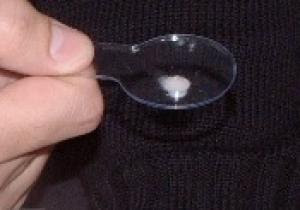
A quick breath check in the palm of your hand can never give accurate results. Whether you're about to lean in for a smooch or start a job interview, you're better off asking a trusted friend if your breath is sweet. But what if a friend isn't around when you need one?
Tel Aviv University researchers have come up with the ultimate solution — a pocket-size breath test which lets you know if malodorous bacteria are brewing in your mouth. A blue result suggests you need a toothbrush. But if it's clear, you're "okay to kiss."
Until now, scientists believed that only one population of bacteria (the Gram-negative ones) break down the proteins in the mouth and produce foul odor. But Prof. Mel Rosenberg and Dr. Nir Sterer of TAU's Sackler Faculty of Medicine recently discovered that the other population of bacteria (the Gram-positive ones) are bad breath's bacterial partner. These bacteria appear to help the Gram-negative ones by producing enzymes that chop sugary bits off the proteins that make them more easily degraded. This enzymatic activity, present in saliva, serves as the basis for the new "OkayToKiss" test.
Prof. Rosenberg, international authority on the diagnosis and treatment of bad breath, who co-developed the kit with Dr. Sterer, published their findings this past March in the Journal of Breath Research, of which Prof. Rosenberg is editor-in-chief. An earlier invention of Prof. Rosenberg led to the development of two-phase mouthwashes that have become a hit in the UK, Israel and elsewhere.
From the Lab to Your Pocket
The patent-pending invention is the result of ongoing research in Prof. Rosenberg's laboratory.
"All a user has to do is dab a little bit of saliva onto a small window of the OkayToKiss kit," explains Prof. Rosenberg: "OkayToKiss will turn blue if a person has enzymes in the mouth produced by the Gram-positive bacteria. The presence of these enzymes means that the mouth is busily producing bacteria that foster nasty breath," he explains.
Apart from its social uses, the test can be used as an indicator of a person's oral hygiene, encouraging better health habits, such as flossing, brushing the teeth, or scheduling that long-delayed visit to the dentist.
OkayToKiss could be ready in about a year for commercial distribution, probably in the size of a pack of chewing gum, to fit in a pocket or purse. It is disposable and could be distributed alongside breath-controlling products.
Science Behind the Smells
"For about 7 years now, we've suspected that there's another kind of bacteria at work in the mouth which causes bad breath," says Prof. Rosenberg. "Now, we are able to grow these bacteria from saliva in an artificial biofilm, showing that there are two distinct populations at work."
In the biofilm — the basis of the new breath test — the color difference between the Gram-positive and Gram-negative bacteria is remarkable. In the top layer of the biofilm, the bacterium take the glycoproteins in the saliva and chop off sugar residues to produce volatile proteins. On the lower layer in the biofilm, which could roughly be compared to one's tongue or inner lining of the mouth, reside the known and established Gram-negative bacteria.
Biomarkers, like the ones used by Prof. Rosenberg's new invention, are the basis of popular diagnostic kits today, like home pregnancy tests or glucose monitors used by diabetics. Checking the sweetness of one's breath may seem frivolous, but millions worry about it on a continual basis. Prof. Rosenberg's continued research into biomarkers in saliva is very promising for diagnosing other more serious disorders, including indicators for lung cancer, asthma and ulcers.
Prof. Rosenberg has summarized his twenty years of his research and experience on bad breath problems in a new book, Save Your Breath, due out in two months. This new work is a collaborative effort with Dr. Nir Sterer and Dr. Miriam Shaharbany of the Sackler Medical Faculty.
Spiga
INTERNAL MEDICINE The internal medicine blog , where you can have details on alternatice medicine , latest trends in medicine , new drugs in the market , school of medicine etc
Bad Breath? New Pocket-sized Breath Test Developed
Wednesday, May 20, 2009 at 7:34 AM Posted by Sajith
Subscribe to:
Post Comments (Atom)
Search
Labels
- Alzheimer's (10)
- Antibiotics (7)
- Anxiety (1)
- articles (2)
- Bacteria (1)
- behavioral abnormality (1)
- Bio technology (1)
- Brain (8)
- breast cancer (6)
- Cancer (40)
- cancer treatment (7)
- chemotherapy (6)
- Chlamydia (1)
- Cytology (3)
- Death (1)
- Diabetes Mellitus (7)
- Diet (17)
- DNA (1)
- Doctors (1)
- epilepsy (2)
- Fossil (1)
- fruits (1)
- genes (6)
- Genetics (13)
- Geriatrics (1)
- Health (12)
- Heart diseases (9)
- Herbal Medicine (2)
- HIV and AIDS (7)
- influenza (1)
- Inventions (1)
- IVF (1)
- latest findings (1)
- Life style (2)
- Lung Cancer (1)
- Lung Disease (9)
- Microbiology (1)
- Multiple Sclerosis (1)
- Nanotechnology (3)
- Neonatology (1)
- neurology (1)
- News (18)
- Parkinsonism (2)
- Prevention (1)
- Primates (1)
- Prostate cancer (1)
- Prosthetics (1)
- seizure (2)
- Skin (1)
- STD (2)
- Stem cells (9)
- Stroke (1)
- Surgery (2)
- Swine flu (11)
- Virus (1)
- weight loss (1)
Search The Web
Blogger Template by B-Themes | 2008
Minyx v2.0 template es un theme creado por Spiga. | Minyx Blogger Template distributed by eBlog Templates

0 comments:
Post a Comment